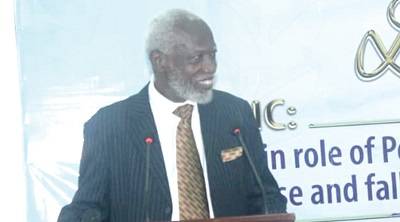As they prepare for positions of leadership in the nation, the kids have been counseled to uphold the nation's principles.
Prof. Emeritus Stephen Adei contends that in order to develop the youth into qualified leaders for the nation's fast growth, principles like honesty, discipline, patriotism, a decent work ethic, and meritocracy at all levels must be ingrained in them.
At the Ghana Institute of Management and Public Administration (GIMPA) in Accra, he offered counsel at his inaugural lecture.
The failure of their parents and instructors to inculcate discipline in them as children, including behaviors like cheating in exams at the basic and secondary levels, is what Prof. Adei blamed for certain public workers' bad behavior.
"At tertiary institutions, student leadership and membership in the Tertiary Students Confederacy (TESCON) and Tertiary Education Institutions Network (TEIN) have also become the fastest way to join the corrupt and bureaucratic classes, and we should all be concerned," he continued.
Prof. Adei said that persons who lived beyond their means may be assumed to be corrupt unless they could explain them, and that leaders must be pressured to behave well.
I've heard that our laws do in fact allow for it, and if they do, we must make that clear, he continued.
Event
The central role of political and public sector leadership in the growth and collapse of nations: Lessons for Ghana was the subject of Prof. Adei's talk.
Victor Mamphey, the first Ghanaian principal of GIMPA, and Dag Hammarskjöld, the second secretary-general of the UN, were honored at the speech for their achievements in the organization and in the world at large.
Academics, traditional leaders, and public workers were among those present, and they addressed topics including enhancing public leadership for the nation's sustainable development.
Prof. Adei added that effective leadership required the capacity to organize a significant number of followers with a vision and plans to carry out a positive agenda of change while resolving issues that impeded advancement.
That was due to its essential and indispensable role in agenda shaping, including the selection of a powerful steering coalition of cabinet members, advisors, and important officeholders, he claimed.
holders and listed nations like South Korea, China, Malaysia, and Thailand, where they, according to him, invested in the leadership's intellectual input.
The progress of the nation was hampered, in Prof. Adei's words, by "a double whack of poor political leadership, corruption, and politicized and inefficient bureaucracies."
Meritocracy
He said that in order to guarantee the provision of high-quality services, hiring and promotion decisions must be made purely on the basis of merit, efficiency, honesty, accountability, transparency, and neutrality, among other principles.
Prof. Adei underlined the importance of strengthening developmental leadership for the nation's future.
The corrupt process of selecting political leaders, where corruption and money control from the party level, is the largest barrier to "good" individuals becoming leaders, though.
holders and listed nations like South Korea, China, Malaysia, and Thailand, where they, according to him, invested in the leadership's intellectual input.
The progress of the nation was hampered, in Prof. Adei's words, by "a double whack of poor political leadership, corruption, and politicized and inefficient bureaucracies."
Meritocracy
He said that in order to guarantee the provision of high-quality services, hiring and promotion decisions must be made purely on the basis of merit, efficiency, honesty, accountability, transparency, and neutrality, among other principles.
Prof. Adei underlined the importance of strengthening developmental leadership for the nation's future.
The corrupt process of selecting political leaders, where corruption and money control from the party level, is the largest barrier to "good" individuals becoming leaders, though.
"We must increase both the demand for and supply of strong leadership. Demand for strong leadership is essential in this high-risk industry, he continued.
Commitment
Prof. Samuel Kwaku Bonsu, Rector of GIMPA, highlighted the determination of the school to take on the task of training students for different leadership roles to support the development of the nation and the subregion as a whole.
I'd want to reiterate that GIMPA is in a good position to lead in this area where we work to foster the growth of the continent's future leaders, he continued.


